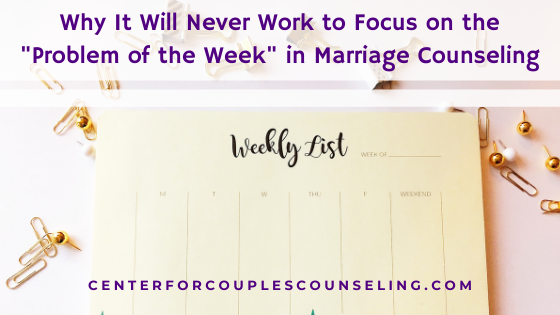Why It Will Never Work to Focus on the "Problem of the Week" in Marriage Counseling
Last week we talked about the first step in marriage counseling being similar to decluttering your closet. You’ve come in for the first session, begun building a relationship with your therapist, and laid out all your marriage issues on the table. I like to help my clients get a clear sense of what therapy will entail and the major goals before they’ve left the first session. This clarity helps clients filter through all the stuff (i.e. relationship clutter) they’ve been holding onto and focus on what’s really important to rebuilding or strengthening their marriage.
I mentioned two major considerations in letting go of the details/hundreds of topics that may bring you into marriage counseling. Firstly, the content related problems (what the fight is about) can be refocused into process related solutions (how you communicate) that will result in longer lasting and more meaningful changes in the marriage. Secondly, the relationship clutter you’ve just unleashed in my office is actually a symptom and is distracting you from getting to the underlying problem.
Today, we’re going to explore consideration number one and dive into turning content oriented, problematic thinking into process oriented, solution-based thinking. Just about every couple I see comes to therapy because something has recently happened. It could be a major fight, a betrayal, a family of origin issue, a broken boundary, ongoing conflict, etc. Whatever the reason couples initiate therapy, the beginning sessions are usually content heavy, meaning the therapist and couple are pouring through specific fights, incidents, historical events, and the unclear text that happened an hour before the session.
The therapist will utilize a number of techniques to help couples work through their initial issues and meet their preliminary goals. Couples often experience a great deal of change in the beginning phase of treatment, which marriage and family therapists refer to as “first order change.” First order changes are solutions that do not change the problem but that create stability. Essentially, couples can feel relief by getting some movement and resolution to the problems that they entered therapy with, and this progress can alleviate tension and be motivating.
At this point in therapy, couples tend to fall into the pattern of bringing the problem of the week into their marriage counseling. Every week, couples find themselves discussing the new issue that arose, they are reminded of the skills they’ve learned so far, and conflict is resolved. This could really work for a while, but remember this would only be implementing first order change, which is really just managing the symptoms and not healing the real issues.
This is why couples shouldn’t make therapy into solving the problem of the week; it’ll never work in creating long lasting change that actually heals the relationship. This enduring change is called “second order change” which means not just altering behaviors themselves, but shifting the entire system to resolve the underlying issues. All of a sudden, we’re moving from figuring out what couch to buy to exploring how to integrate two partner’s lives and creating a value system for a marriage.
Leaning into working on second order change can be scary, because you’re finally feeling better with the first order work you’ve done and now you’re getting into the meat of things; it’s vulnerable. Trust your marriage counselor to lead you in a direction you’re ready to go and do real work to change your relationship for the better. When you start communicating about how things unfold between you and your partner, learn to let your guard down, and show up for your marriage in a genuine way without defensiveness and a willingness to look at the messy parts of your relationship, you’re starting to make serious steps forward.
Although it’s a more emotionally challenging part of therapy, it’s also the most rewarding place to get to. Next week I’ll be talking about relationship clutter as a symptom and why it’s distracting you, but until then I’m curious about something. What would your marriage be like if you were able to move from first order to second order change? What would it be like for you and your partner to show up as your genuine selves everyday for each other? How can you start to let go of the problem of the week? Let me know below.

